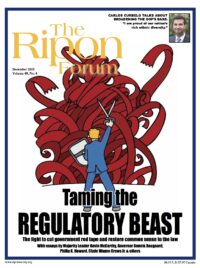THE RIPON FORUM recently contacted the National Federal of Independent Business with a simple request – namely, to find out how federal rules and regulations are affecting the 325,000 small and independent business owners they represent around the United States. Below are first-person accounts from four NFIB members about their own experiences with government red tape, how it is impacting each of their businesses, and how what often sounds like a good idea in Washington too often causes problems for hard-working Americans as they try to make a living and go about their lives.
_____________________________________
Randy Ballinger – Owner Walnut Creek Golf Course – Marion, Indiana
When Congress passed the Clean Water Act, they wrote that it should cover “navigable waters.” For a while now, the Environmental Protection Agency has been pushing the boundaries of that law, trying to regulate tiny bodies of water and even places where water only occasionally flows.
This summer, the EPA released a new rule that could be devastating for small businesses who own land. Effectively, the reach of the Clean Water Act would be pretty much anywhere water can run. Almost any modification to your land could invite the scrutiny of regulators, leading to fines and fees that could be devastating.
Dozens of states and groups including the National Federation of Independent Business are suing to stop this from happening. There’s a good chance that they could win. Twice in recent years the Supreme Court limited the power of the EPA over water. Maybe this could be strike three.
“We simply don’t have the money to hire someone to take us through the complex permitting process.”
The new regulation is so bad that a federal court actually stopped the EPA from enforcing it for now. No doubt they will fight all the way to the Supreme Court to expand their power.
The EPA’s talking points pretend that only the federal government can protect water when states already have significant power to regulate within their borders. Washington isn’t the only place where people care about the quality of our streams and rivers. Small businesses shouldn’t have to worry about duplicative regulations.
My family built our first golf course decades ago. We’ve built a second course and a thriving business with a third generation of the family now involved. If the EPA gets their way, our land could be made practically worthless. We simply don’t have the money to hire someone to take us through the complex permitting process. This is a regulation that could do real and lasting damages to family businesses and we can only hope that the courts or a future President puts a stop to the madness.
_____________________________________
Kevin Vanatta – Owner, Newberry Motors, Newberry, Michigan

The cost of regulation to the American economy is reaching an estimated $2 trillion annually. That is a huge and growing weight on our economic growth. For small business, regulations hit especially hard.
A few years ago, the Small Business Administration tried to figure out how much more costly regulations are to small businesses compared to larger ones. They found that it costs small businesses about 36 percent more to comply.
Federal agencies are continually churning out new and burdensome regulations at an astonishing rate. In just the last few months, the Obama administration has pushed forward new rules that make electricity more expensive, that change long-standing rules for independent contractors, and that expand the reach of water regulations.
“It’s impossible for a small business owner to keep up with the standard regulatory process.”
My business, Newberry Motors, sells a product that was highly regulated before the Obama administration. This President has piled on additional rules, driving the price higher and higher. The Heritage Foundation estimates that new fuel efficiency standards could raise the cost of a car more than $3,000 by 2025. What is the breaking point for consumers? We may find out.
The NFIB Small Business Legal Center recently put out a report documenting the many new ways that the bureaucracy is creating “underground regulations.” In recent years federal agencies have promulgated more than 80,000 pages annually in new regulations – and that’s only counting those rules that have gone through the formal notice-and-comment process. But increasingly, agencies are making new binding rules, under the radar, with obscure opinion letters, “guidance” documents, legal briefs and enforcement actions.
It’s impossible for a small business owner to keep up with the standard regulatory process. Underground regulations are just making it even harder to comply with all the rules.
_____________________________________
Seth Reeves – Owner, Reeves Mortgage – Longview, Texas
At Reeves Mortgage, we help people live their dream of owning a home. It’s a big decision. They may spend the rest of their lives in that home. It’s a big expense and there’s a certain amount of caution that should be undertaken by buyers and banks. Unfortunately, the federal government has complicated that process; not to defend homebuyers, but to benefit highly connected banks.
A few years ago, the New York Attorney General, the Federal Housing Finance Agency, and Freddie Mac created the Home Valuation Code of Conduct. This forced appraisers to work for an Appraisal Management Company, many of which are partially owned by big banks. The rule was a de facto law created outside the typical notice and comment procedure.
“Decisions made behind closed doors and with no input from the public are increasingly becoming the law of the land.”
Small businesses like mine had no ability to object or even offer constructive criticism. The small business organization I’m a member of, the National Federation of Independent Business (NFIB), recently documented many of the ways government agencies are creating these underground regulations. Decisions made behind closed doors and with no input from the public are increasingly becoming the law of the land.
Tens of thousands of pages of regulation are written through the standard process, and now small businesses have to also be worried about all sort of letters, enforcement actions, and amicus briefs that could affect how we are ruled. Federal agencies should regulate only with the consent of the governed. They should not be independent bureaucracies operating as the legislative, executive, and judicial branches all on their own.
_____________________________________
Patti Zayas – Owner, Emerald Medical Staffing – Cleveland, Ohio
There aren’t many bureaucrats who run a business before they embark on a career of writing regulations. It’s a big reason why all too often rules intended to help people backfire. I’m seeing this firsthand with a new Department of Labor rule extending overtime pay to home health care workers.
For many years, home health care workers were like many other domestic workers, they were not subject to typical overtime pay rules. Home health care work is rather different from most other blue collar jobs, but now the government equates it with high impact jobs like construction or manufacturing.
Emerald Medical Staffing provides home health care workers, mainly for homebound elderly persons. Our reimbursements are fixed by insurers, so we have a hard cap when it comes to our personnel costs. We will now have to strictly limit worker hours.
“Home health care work is rather different from most other blue collar jobs, but now the government equates it with high impact jobs like construction or manufacturing.”
Many of our customers appreciated having the same worker with them all week. Now, we will have to rotate workers out when they reach their limit. This will make both our customers and are workers unhappy.
The new rule doesn’t make a business more profitable – the only way that employers can actually increase wages. Businesses will adjust worker hours to prevent payroll costs from swamping their budget. Workers won’t see more take home pay, just more rules requiring them to document their hours.
There is no real upside to this rule change. At the end of the day, the only people who might get paid more are the regulators at the Department of Labor working overtime to check up on millions of workers now subject to increased oversight. This rule will only have negative effects on workers and businesses.




